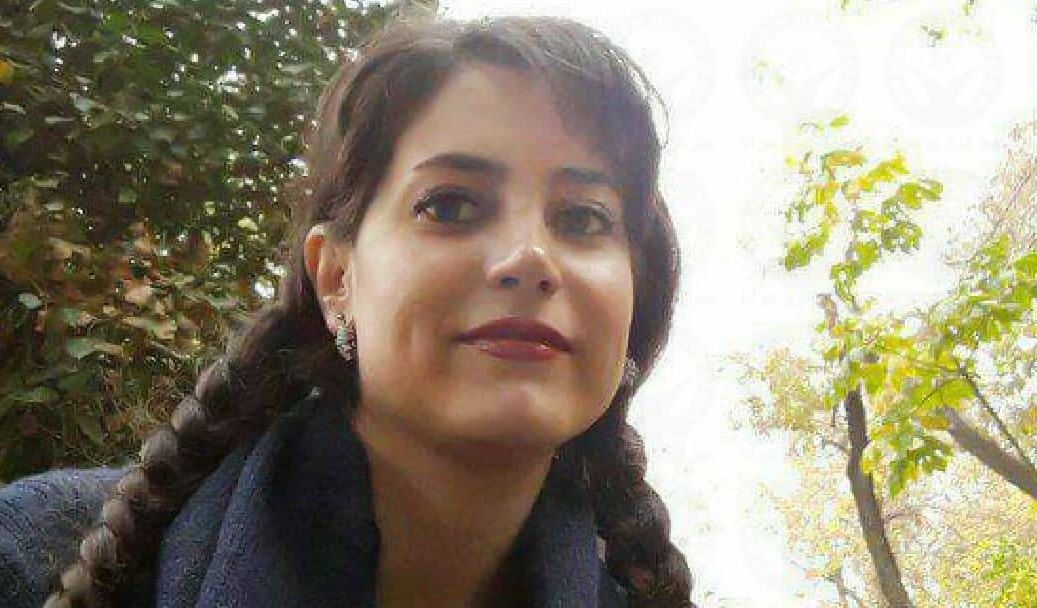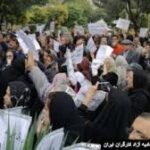
On 3 March 2022, political prisoner Shakila Monfared began a hunger strike in protest against the deliberate confining of political prisoners to the same wards as violent-category felons and the irresponsibility of prison officials towards her safety – which had led to her being attacked by a fellow inmate.
According to several reports from Iranian activists and human rights organisations, on 7 June 2021, Ms. Monfared was verbally abused, beaten up, and attacked with an improvised weapon fashioned from the sharpened lid of a tuna can by other inmates on the ward in which she was being held at the notorious Qarchak Prison in Varamin. Ms. Monfared’s assailants – prisoners convicted of violent crimes – were apparently incited and encouraged to attack her by prison staff, who then omitted to intervene,
The holding of political prisoners, like Ms. Monfared, on the same wards as violent criminal offenders is a deliberate and flagrant violation of the law which stipulates that prisons are required to divide prisoners and allocate them to separate confines according to the classification and nature of their conviction.
Thus, under Article 69 of the [Iranian] State Prisons Organisation’s regulations, “All convicts, upon being admitted to walled prisons or rehabilitation centres, will be separated based on the type and duration of their sentence, prior record, character, morals, and behaviour, in accordance with decisions made by the Prisoners Classification Council.”
Furthermore, under the UN’s Standard Minimum Rules for the Treatment of Prisoners (the Nelson Mandela Rules): “The different categories of prisoners shall be kept in separate institutions or parts of institutions, taking account of their sex, age, criminal record, the legal reason for their detention and the necessities of their treatment.”
However, despite these provisions, there is a clear emerging pattern of political prisoners being moved by the regime’s prison authorities on to the same wards as not only the general prison population but those containing dangerous and violent offenders. This renders the political prisoners particularly vulnerable to abuse, intimidation, threats, violent attacks and even murder within the prison walls. It is widely believed that prison staff incite and even facilitate the targeting of the political prisoners by other hardened inmates.
According to this pattern, and despite the rules which are supposed to prevent it from happening, political prisoners are often suddenly and without notice shipped out and “exiled” to more remote prisons with much harsher conditions – including Greater Tehran Central Penitentiary and Rajai Shahr Prison for men, and Qarchak Prison for women. These transfers are punitive and designed to disorientate and isolate the political prisoner and worsen their ordeal so as to break them. As part of this, they are placed in close confines with dangerous prisoners convicted of violent crimes who require little incentive to target the new arrivals.
Ms. Monfared, born in 1993, was arrested by agents from the Ministry of Intelligence outside on 31 August 2020 on account of alleged anti-regime political activity via her output on social media. She was initially held at the “Sarallah headquarters” detention centre controlled by the Islamic Revolution Guard Corps (IRGC) in Tehran. This was despite there being no clear grounds or warrant for her arrest. She was then transferred to Evin Prison, before being released on a bail of 400 million tomans pending the completion of legal proceedings against her.
In January 2021, Ms. Monfared was summoned to appear before Branch 26 of the Revolutionary Court of Tehran – where she was jointly tried with co-defendants Arsham Rezaei and Mohammad Abolhassani – and sentenced to a one-year prison term on the charge of “propaganda activities against the system” and a five-year prison term on the charge of “insulting the sanctities of Islam [blasphemy]”. She was also sentenced to a further term of probationary work [forced labour] in the “Agricultural Jihad”. The other two defendants were sentenced to 15 months in prison and 4 months’ probationary work on the charge of “propaganda activities against the system” despite the charge being punishable by a maximum of 12 months in prison according to the country’s Islamic Penal Code.
In late-March 2021, Branch 36 of the Tehran Court of Appeals reduced Ms. Monfared’s sentence to a total of four years and two months in prison.
However, barely over a month later, in May 2021, Ms. Monfared was suddenly banished from Evin Prison to the dreaded Qarchak Prison. The prison, situated in the desert 30 kilometres south-east of Tehran, is notorious for its poor health and sanitary conditions – with no functioning drains or sewers – and being massively overcrowded with a prisoner population over twice its designed capacity. The prison was severely ill-equipped to deal with the coronavirus pandemic and the disease spread rapidly within its confines as a result.
In December 2020, it is alleged that the director of Qarchak Prison, Ms. Soghra Khodadadi, oversaw and participated in a violent attack against female prisoners of conscience along with 20 prison guards. The attack was apparently ordered in retaliation for those prisoners having chosen to continue to exercise their right to freedom of expression.
Despite repeatedly raised concerns regarding the continued threats to the safety of Ms. Monfared and other political prisoners posed by the violent-category inmates held alongside them at Qarchak Prison, Ms. Monfared was harassed and then attacked within a month of her arrival there.
Ms. Monfared was granted a brief furlough on 23 August 2021 but was returned to Qarchak Prison on 7 September 2021.
There are growing concerns for the safety and wellbeing of Ms. Monfared as well as the several other women imprisoned at Qarchak for no reason other than daring to oppose the line and politics of the Islamic Republic regime.












 Posted in
Posted in 











